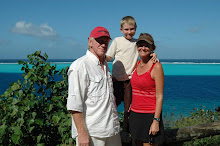As I made my final morning jog through the streets of Neiafu this morning, I reflected on our six weeks in Tonga. We certainly enjoyed our time here - especially our week with good friends from the states, Paula and Tom Millar, and our island adventures with cruiser friends on Totem and IO. However, I leave with a strange feeling of negativity that is difficult to explain and makes me sad.
There are two distinct worlds attempting to co-exist in this small country: the native people and the ex-pat community, referred to as palangi (foreigner). The fallout of the collision of these polarized cultures has resulted in an uncomfortable setting. One Tongan woman, Ana, described the relationship between Tongan and palangi, "The palangi....," she scoffed, "they fight among themselves all the time. They always want to take each other to court. Tongans don't do that. We just laugh at them." Although it is not fair to categorize all palangi together, many in Tonga seem to have a superior attitude. They want to live in paradise and make a decent living. So they exploit this beautiful country and its natural resources, including the whales. They charge American prices but pay Tongan wages. Many don't bother to learn the Tongan language. On the morning cruisers net, they inappropriately bicker about petty things. Frankly, my uncomfortable feeling comes from being embarrassed by the fact that I am a palangi myself and somehow associated with "them". I even felt the Tongan people were not as friendly to me because I was one of "them". I wanted to get away from "them"!
Being anchored away from the town (Neiafu) was a completely different feeling. On many islands, we visited villages, attended traditional feasts and went to churches and schools. We went diving, snorkeling and hiking. The people were welcoming and sincere. In the Hapai group of islands we met palangi who were not saddled with the pettiness of Vavau. It was refreshing and pleasant. I felt disassociated with the full-time palangi of Vavau and that uncomfortable feeling dissipated. When I remember Tonga, these are the feelings and memories I hope will resurface from my time here.
Ann - September 14, 2010


